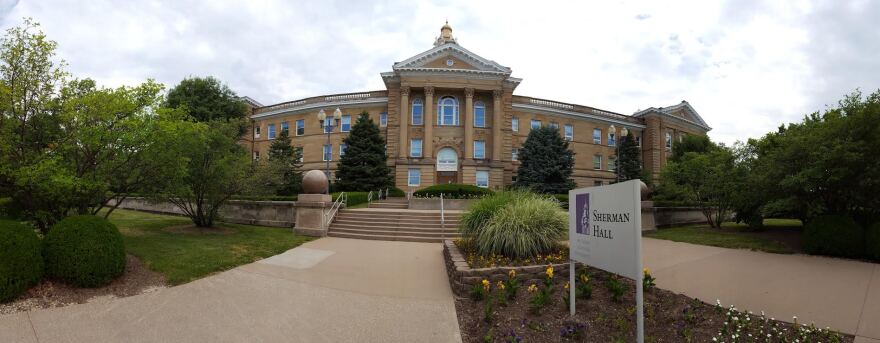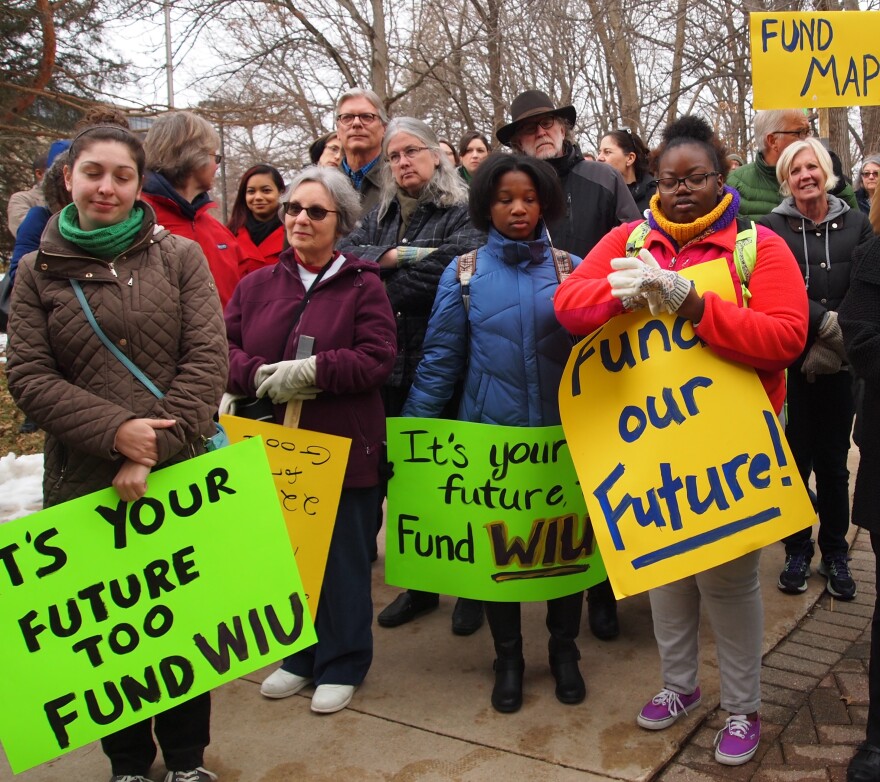Western Illinois University will receive $31.4 million from the state's stop-gap funding measure, plus about $5.1 million to reimburse the university for the Monetary Award Program (MAP) funding it loaned to students for the spring semester. But that still falls far short of what the university might normally expect from the state.
“If we look at this as an 18 month cycle (Fiscal Year ’16 and six months of Fiscal Year ’17) – normally we look at 12 but look at this as an 18 month cycle – normally we would have expected to receive about $72 million during that time. Now we’ve been appropriated $46 million,” said WIU Budget Director Matt Bierman.
“Does this change anything? It doesn’t change anything. It allows us to continue operations as we have. We will still continue to have to make some decisions as we go forward.”
Those decisions regard staffing levels. Bierman said the administration will determine within the next 30 days what positions need to be filled for the fall semester. It’s not known how many – if any – laid off workers will be brought back, and a hiring freeze remains in place.
“This (the stop-gap measure) does not change the lay-offs. They’re not coming back tomorrow, we’re not going to call them back tomorrow. But we are evaluating what we do need for the fall semester,” said Bierman.
The state’s stop-gap funding measure, along with revenue from this fall’s tuition and fees, is supposed to help universities survive financially through the end of the calendar year, and they should receive a boost in January when tuition and fees come in for the spring semester. But Bierman said that’s cutting it close for Western.
“I will tell you based upon my analysis that it will be a very tight bridge to get to January without using our bond funds,” said Bierman.

The bonds referred to are Auxiliary Facilities Systems Funds, which normally pay for expenses related to university housing and dining, campus recreation, and the University Union. The Board of Trustees authorized the use of such funds – if needed – during a special meeting in April, at which time WIU President Jack Thomas referred to it as a measure “of last resort.”
The university has said it has $20-$30 million available in auxiliary funds. The money is not from the state – it was accrued through the sale of tax exempt bonds. Bierman said without the stop-gap measure, Western would have dipped into those funds by the end of July.
Bierman said it’s also possible WIU will have access to emergency funding allocated by the Illinois Board of Higher Education if finances become difficult for the university.
“We urge – urge – the legislators to come together and pass a comprehensive budget for the whole two years,” he said, adding state lawmakers from the Macomb area and the Quad Cities should be acknowledged for working hard to ensure WIU and the rest of public higher education received some cash for now.
Hammond Helped Develop the Stop-Gap Measure
State Representative Norine Hammond (R-Macomb) served on both the House budget committee and a special working group focused on funding higher education.

She said they developed the framework for the six month plan, gave it to the Democratic and Republican legislative leaders and Republican Governor Bruce Rauner to tweak, and then put it before the legislature for a vote. It passed, warding off a government shut down and giving state social services and public universities six months of breathing room.
Hammond said the partial state budget wasn’t her first choice but she is happy that K-12 public schools will receive a full year’s worth of state aid -- and at 100% funding, which has not been allocated in years.
Ideally, Hammond said she would like to fully fund higher education too, but there’s not enough money available for it now. Instead, the six-month stop-gap measure gives public universities exactly what they need to skate by. She said that was determined by the working groups reaching out to university leaders to determine the amount of state aid they absolutely had to have.
“You have a January 2nd payroll date, what is the amount of money you need to get you to that payroll date?” Hammond said was asked of university leaders. “And the universities, to their credit, put their pencils to their paper and came back to us with what they had to have.”
Hammond said she applauds state universities for the work they’ve done to educate students despite significant cuts in state aid for more than a decade.
Other Republican politicians from west central Illinois came together in Macomb Friday to publically congratulate Hammond for what they called a job well done. The state legislature was able to pass a six month spending plan on Thursday in the final hours of Fiscal Year 2016, after a going a year without a budget.
Those Republican lawmakers voicing support of Representative Hammond included Congressman Darin Lahood of Illinois’ 18th District, State Representative Randy Frese of the 94th District, and former state Representative Jil Tracey, who is running unopposed to replace outgoing Senator Jon Sullivan in the 47th District.
Hammond said the way the six-month budget plan’s framework was developed by the budget working group, of which she was a member, has never been done before in Illinois. “We have a process now, we know it works, it works very well and I would like to see this continue in the very near future,” Hammond said.
Hammond said she prefers this method over a top down approach to government, “If the leaders can’t do it, for whatever reason, then let the rank and file members do it,” Hammond said.
State lawmakers will take some time off before getting back to work to craft another budget plan for the remaining six months of the 2017 fiscal year.
Hammond said the veto session scheduled for November would likely be the next time the legislature would vote on another budget proposal.










